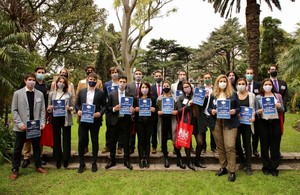24 Argentines will study in the UK with Chevening scholarships
World news story
We welcomed at the Ambassador’s Residence the group of young Argentines who were awarded Chevening scholarships

The group of 2021/2022 Chevening scholars
On Monday 6 September, Chargé d’Affaires, Elizabeth Green, bid farewell to the 24 Argentines who will leave for the UK to do their master’s studies for a year, wishing them a safe and successful trip.
The Chevening scholarships allow outstanding young leaders to carry out postgraduate studies at a British university of their choice with all the expenses covered.
The Chevening program began in 1983 and has developed into a prestigious international awards scheme. Chevening Scholars come from over 160 countries and territories worldwide, and nearly 10,000 scholarships have been awarded in the past five years. There are more than 50,000 Chevening alumni worldwide, who make up an influential and highly respected global network. In Argentina, more than 500 people have been selected to participate in this prestigious program.
Applications to study during 2022-2023 are open from 3 August to 2 November 2021. Apply today at https://www.chevening.org/apply.
Complete list of 2021/2022 scholars
- Agustina Callegari – Digital Technologies and Policy – University College London
- Ana Paula Valacco – Journalism, Media and Communications – Cardiff University
- Catalina Marino – Urban Development Planning – University College London
- Eduardo Eugenio Barbier – Space Systems Engineering – University of Southampton
- Esteban Ventisky – Geoenergy – University of Edinburgh
- Federico Martín Acosta Rainis – Data Journalism – Birmingham City University
- Guido Ezequiel Sirna – Management of Information Systems and Digital Innovation – London School of Economics and Political Science
- Gustavo Adrián Streger – Strategic Communications – London School of Economics and Political Science
- Josefina Ichaso – Management of Innovation – Goldsmiths, University of London
- Lidia Piccinino Centeno – Innovation, Public Policy and Public Value – University College London
- Lucila Citcioglu – Public Health – London School of Hygiene and Tropical Medicine
- Maida Elina David – International Social and Public Policy – London School of Economics and Political Science
- María Delia Porta – Governance, Development and Public Policy – University of Sussex
- Mariana Paterlini – International Development – University of Warwick
- Matías Alejandro Caro – Criminal Justice and Criminology – University of Leeds
- Micaela Santilli – Behaviour Change – University College London
- Nicolás Hernán Varela – Law and New Technologies – Birkbeck, University of London
- Nicolás Malone – Laws – Queen Mary University of London
- Pablo Hilaire Chaneton – Master in Public Policy – London School of Economics and Political Science
- Paloma Etenberg – Arts Administration and Cultural Policy – Goldsmiths, University of London
- Ramiro Lucini – Criminal Justice Policy – London School of Economics and Political Science
- Santiago García Vence – Master of Laws – London School of Economics and Political Science
- Tomás Pasquette – Social Innovation and Entrepreneurship – London School of Economics and Political Science
- Vanesa Nahir Acosta – Social Innovation and Entrepreneurship – London School of Economics and Political Science
Published 7 September 2021